Tales from the pit
The US Cyclocross Nationals at the International Speedway in Portland, OR, were three days of some...
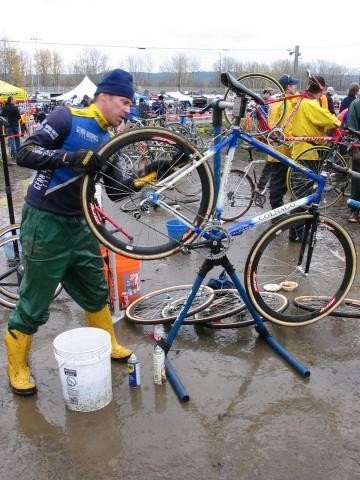
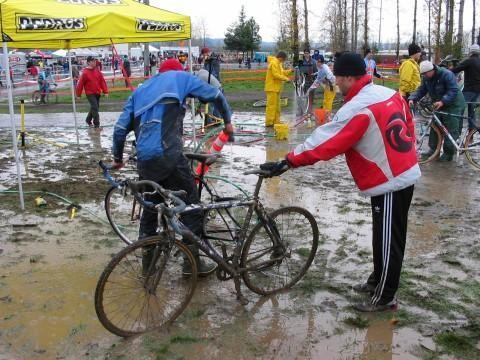
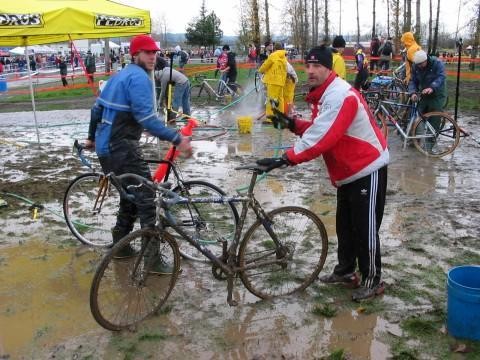
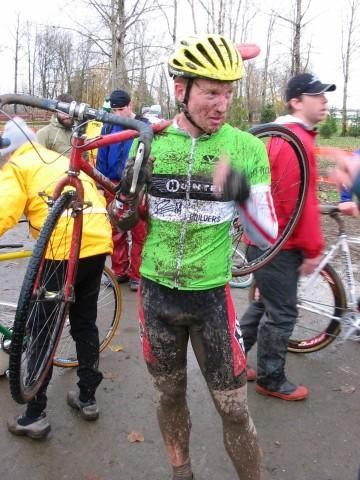
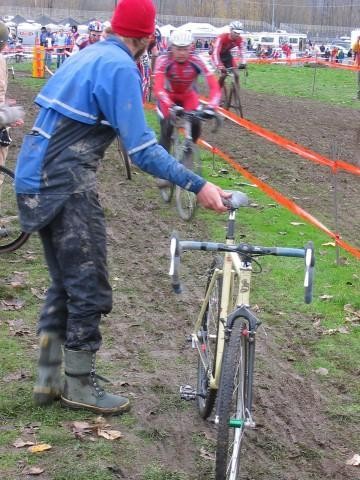
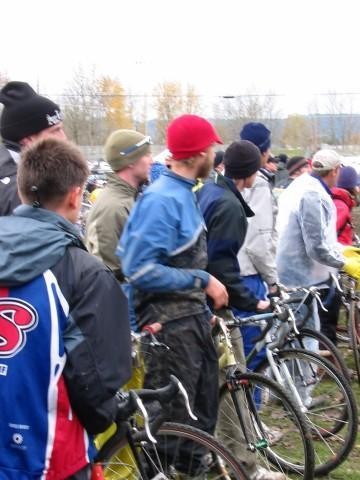
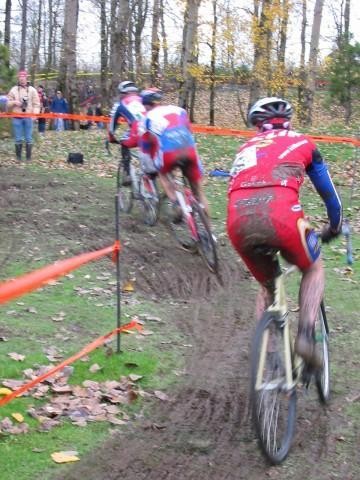

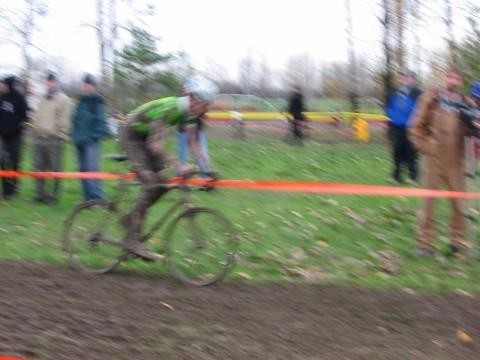
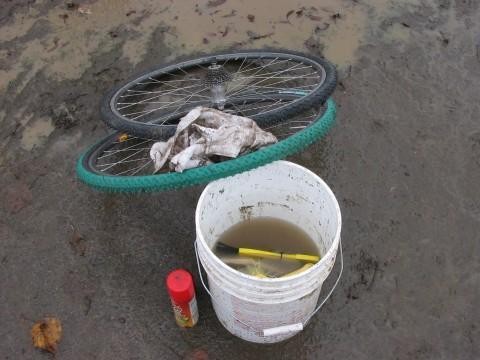





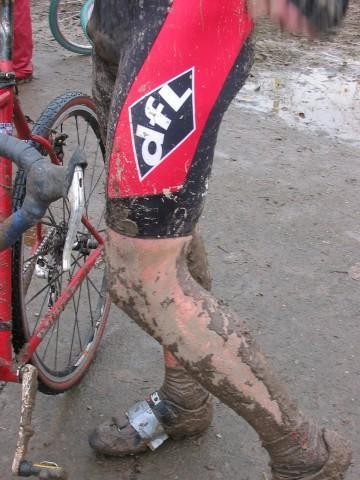
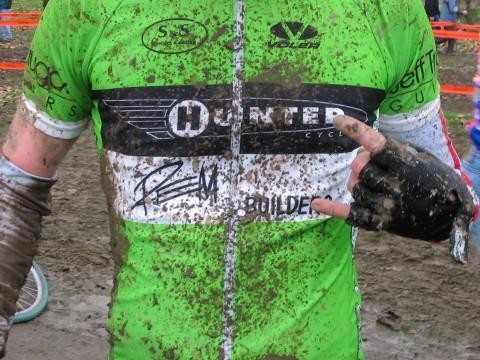
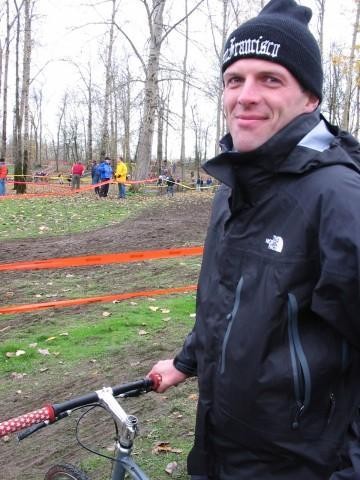

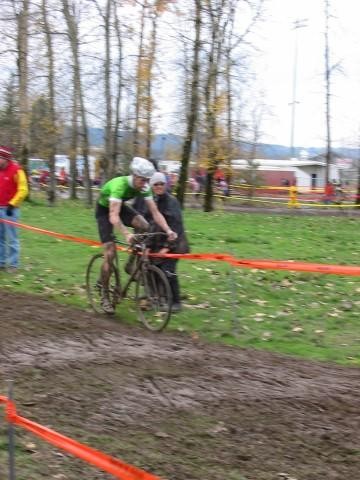



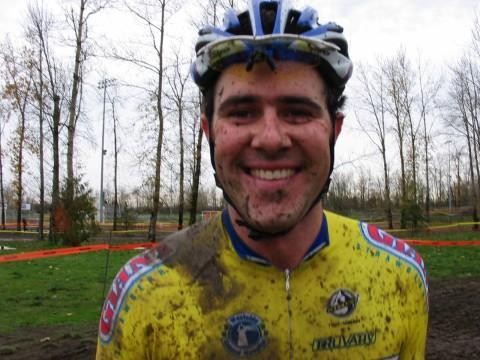
Tales from the ('cross) peloton, November 19, 2004
Getting down and dirty with the fast guys' bikes
The US Cyclocross Nationals at the International Speedway in Portland, OR, were three days of some of the year's stickiest and muckiest racing. Ever wonder how racers manage to keep their bikes clean when they themselves are so dirty? What exactly goes on in the pit, the area where wrenchers in Wellingtons line up to assist their riders by switching their bikes out during the race? Ella Lawrence braved the pit during the masters' 30-34 race last Saturday to get some insider's knowledge on the scene behind the pressure-washer.
As the gun went off and the racers lunged forward, I squeezed myself between muddy, tense mechanics next to Cameron Falconer, an elite racer for Team Hunter, a scruffy grassroots team out of Santa Cruz, CA. Falconer's race isn't until tomorrow, but today he's in the pit for two of his teammates, including Rick Hunter, the man who makes the bikes. I ask him what the main responsibilities of someone in the pit are, and he rattles off an answer as he's gathering together buckets, brushes, lube, and rags.
"To give the rider you're responsible for a bike change as necessary, and when you give them the change, to do it in a fashion that doesn't cost them any time. Also, to give them a bike that's functional and not as f****d-up as when they gave it to you. And you have to stay out of the way of all of the other over-caffeinated freaks that are trying to pit for their riders. And not make any enemies and be friends with everyone."
Cyclingnews: What kind of person do you generally find in the pit?
Cameron Falconer:: Most everybody's just got their buddy or their girlfriend or something helping them out. The dynamic in the pro races will be different. There will be proper team support; guys there solely as somebody's mechanic. This race (the previous master's race) there were a couple of guys here who were pretty well-supported, the guy who won (Richard Feldman, from Colorado) had three identical Colnago bikes, and two or three guys in his pit. He won this last year, too.
Get The Leadout Newsletter
The latest race content, interviews, features, reviews and expert buying guides, direct to your inbox!
Falconer continues, "A lot of people show up with a fair amount of equipment and support in the upper category races. But you know the masters do take this stuff pretty seriously, so we see a fair amount of nice Gucci shit and a lot of duplication, people with multiples and a mechanic. People are pretty proficient out here. But at a race like this, the level isn't high enough... you see videos of Europe, or you go to world's and every nation has its own little box where you have to stand and it's very strict. Comparatively, this is pretty haphazard, really, even though it's national championships. The level will come up a whole bunch between now and tomorrow when the elite men and the elite women race. It will be a far more professional scenario in here. But there will also be quite a few people, like me, with whoever they can scrounge up: their sponsor, their buddy, to help them in the pit."
Falconer focuses again on the task at hand, directing his buddy Dillon Snodgras as to where various items will go.
"We'll want have that thing (bucket and brushes) ready for Rick, why don't you lay that here... we'll make a little zone by that pair of wheels over there. See them? WTB tires, black 105 hubs, velocity rims... grab those over here and we'll get Rick's little zone going over here. We're not gonna be doing bike changes for him every lap so we'll just set up his stuff over here. Thanks."
Snodgras hustles to get Rick's spare bike ready (a spray-painted singlespeed with "I love country music" written in black indelible marker on the seat tube) as the riders round the final corner nearing the pit. Falconer directs him.
CF: They're coming so we've got to get in the line-up.
Dillon Snodgras: Um, sure. So, how does this work?
CF: The bike can't touch the ground.
DS: Okay, how do I do this? Hand the bike off thing.
CF: So as your rider comes in, you want to stand like this (at an angle), so you don't get in the way, and hand the bike off square so it's easy to take.
DS: Okay, I see. Hey, there's Rick! Passing dudes, too. Look, we're all edging closer (in the pit). We're not giving anyone any space.
Hunter never takes a bike the entire race, leaving his crew free to chat with a teammate they'd pitted for in the previous race, Rob Sable. He comes over, shivering and covered in mud literally from head to foot. High-and low-fives are exchanged all around.
Falconer offeres up, "Your other bike and your clothes are over there where you left them at the start. I was stoked you weren't taking bikes every half-lap."
Rob Sabel: Oh, I think that would have been excessive.
CF: Feldman, the guy that won it had three identical Colnagos in the rotation! With Record 10-speed on them, and three guys in the pit or whatever. That was f-ing great, man, I thought you were going to catch Prenzlow!
RS: Was that Prenslow ahead of me?
CF: Yeah, he was riding right ahead of you.
RS: I think I was 13th?
CF: Yeah, you rode like f-ing hell man, it was great.
RS: So Prenslow is a pretty fast guy, huh?
CF: Yeah, he's for real, I had to work my ass off to beat him at Reno. He won the first Bay Area Super Prestige in the A's, he beat Ben (Jacques-Maynes).
RS: He was getting a bike change in the last lap. I felt good, I was feeling kind of stuffed up, my breathing, but I kind of opened up in the end. The bike changes, you know, it's a real MORALE BOOST.
CF: Yeah, were they working okay?
RS: Yeah, okay.
CF: Cool. I didn't have any tools so I was just kind of lubing everything I could see and then giving them back to you. I couldn't do much else.
RS: They started skipping gears right toward the end but I was hardly changing gears, so it didn't really matter.
Sabel disappears and reappears later with a Styrofoam cup of hot chocolate and traces of mud still on his face. We stand back and watch as mechanics hustle - because it's Nationals, the pit runs two ways, and so many racers can (and are) changing bikes every half-lap. The frequent changes are certainly beneficial to the riders, whose bikes can clump with upwards of 35 pounds of mud in the sticky course, but certainly puts stress on the mechanics, who have to move their feet quicker than high school girls at volleyball practice to get the dirty bikes in line at the pressure-washer, hosed off, lubed up, run through the gears, and back to the rider in under five minutes.
I ask Sabel, who will also be racing Elite tomorrow, what his impression of the pit is. "Oh, well, it's generally pretty friendly," he replies. "If someone's really in a hurry and they need to get in at the pressure washer, they can get in. But I did hear that a fistfight broke out in the pit between some soccer dads during the juniors race!"